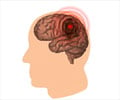Ageism in the NHS means that older stroke patients are not getting the same level of care as younger patients, reveals research in Postgraduate Medical Journal.
Older patients are less likely to be given the appropriate diagnostic tests and lifestyle advice meted out to their younger counterparts, the research shows.The UK government has recently invested in stroke services and pushed for a more evidenced based approach to care, in light of an increasingly elderly population at substantially greater risk of recurrent stroke.
The researchers assessed the treatment given to 379 patients referred to one specialist rapid access (neurovascular) clinic for a suspected minor stroke or mini-stroke, or transient ischaemic attack (TIA), between 2004 and 2006.
One in three had not had a stroke or TIA, and of the remaining 250 patients, almost two thirds (60%) were under the age of 75; the rest were over 75.
Older patients were more likely to be experiencing irregular heart rhythm (atrial fibrillation) and to have a lacunar stroke - the result of narrowed small arteries in the brain.
But the average time lag between the start of symptoms and first clinic appointment among the two age groups was the same, although both age groups experienced substantial delays.
Advertisement
Only one in 20 (4%) of those aged over 75 was given an MRI scan compared with one in four (26%) of the younger patients.
Advertisement
But checks (Doppler ultrasounds) on the speed of blood flow in these arteries were more common in younger patients in the first place.
Nine out of 10 (92%) patients under the age of 75 were given Doppler ultrasounds, compared with just over three out of four (77%) patients over the age of 75.
Both age groups were given appropriate drugs to stave off further strokes (secondary prevention). But younger patients were significantly more likely to be given dietary and weight loss advice than older patients.
Older patients are just as receptive to lifestyle advice and reap as much benefit from it as younger patients, say the authors.
“The results of this study possibly reflect negative views, attitudes and behaviour of healthcare professionals towards older patients,” say the authors, adding that: “rationing of care on the basis of age has occurred in other medical areas.”
But there is growing evidence that older patients benefit from aggressive treatment of their stroke or TIA, they emphasise, concluding: “A change in the attitude of healthcare professionals is needed to root out ageism.”
Source-BMJ
LIN














